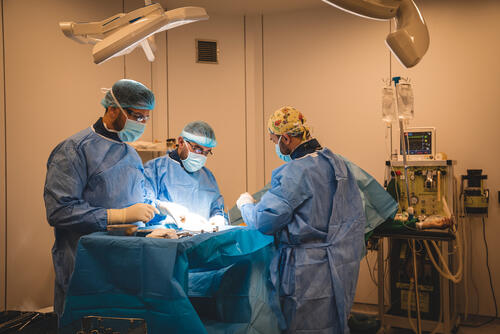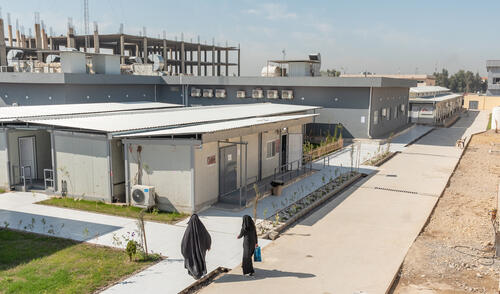Update: Médecins Sans Frontières (MSF) resumed medical activities at Al-Amal clinic and Al-Wahda hospital in Mosul. We received the necessary clearances from the Iraqi authorities to release our cargo and transport supplies from Baghdad to Mosul.
Our next shipment with 20 tons of medical supplies is expected to arrive in Baghdad in the next few weeks. We will continue to work closely with the relevant authorities to reach clear, reliable, and simplified clearance procedures in the future.
Baghdad – Essential medical activities have been suspended at two health facilities run by Médecins Sans Frontières (MSF) in the Iraqi city of Mosul after stocks of medicines and supplies ran critically low.
This decision came as a result of the lengthy, complicated, and opaque official procedures, which have hampered MSF from ensuring a reliable supply to the projects through Baghdad International Airport and from transporting them within Iraq.
We call on the relevant authorities to facilitate clearance procedures in the future so that we can continue providing much-needed medical and humanitarian aid in Iraq.
This is a loss of humanitarian medical assistance that was on its way to being provided, free of charge, to vulnerable people in Mosul.Fernando Galván, MSF head of mission in Iraq
The medical facilities in question are Al-Amal maternity clinic in West Mosul, which provides high-quality emergency maternity and neonatal care and mental healthcare; and Al-Wahda hospital in East Mosul, which provides specialist orthopaedic surgery and comprehensive post-operative care.
“It is unfortunate that we have had to suspend vital activities since 1 June in both facilities due to ruptures in our medical supplies and medications that prevent us from providing services to our patients,” says Fernando Galván, MSF head of mission in Iraq.
“For more than two years, we have tirelessly engaged with all relevant stakeholders, alerting them about the critical situation we would face if the protracted and convoluted supply clearance procedures were not eased,” says Galván.

Five months after landing a cargo of medical supplies at Baghdad International Airport, our teams were finally able to secure the release of some supplies on 22 June, with the support of key actors.
However, many items in the cargo have already expired during transit time, while those that are still useable will have to wait still longer at MSF’s warehouse in Baghdad until permission is granted to transport them to Mosul. In addition, MSF has been asked to pay a storage fee for the time its supplies were held at the airport.
“This is a loss of humanitarian medical assistance that was on its way to being provided, free of charge, to vulnerable people in Mosul, and a waste of financial donations that were intended to provide medical services to patients who need them most,” says Galván.
“We are very frustrated by this situation, especially knowing it could have been prevented with more streamlined and efficient procedures. We are worried that yet more items in our warehouse in Baghdad will expire while we wait for clearance to transport them to Mosul.”
We are very frustrated by this situation, especially knowing it could have been prevented with more streamlined and efficient procedures.Fernando Galván, MSF head of mission in Iraq
We have around 10 additional cargoes of medications, medical supplies and equipment totalling more than 12 tons on their way to Iraq, which will need clearance by authorities to be transported to our medical facilities in Mosul and elsewhere in Iraq.
These items cannot be bought within Iraq and are essential for the running of our activities. They include supplies for a microbiology laboratory that we plan to set up in Mosul.
“We have had to put on hold some of our current and planned activities, including a much-needed microbiology laboratory in Mosul,” says Galván. “We need to have reliable procedures in place for future supplies that are necessary for the running of our activities.”
We remain steadfast in our dedication to supporting the health and wellbeing of the people of Iraq and will continue to advocate for improved access to health services countrywide.



